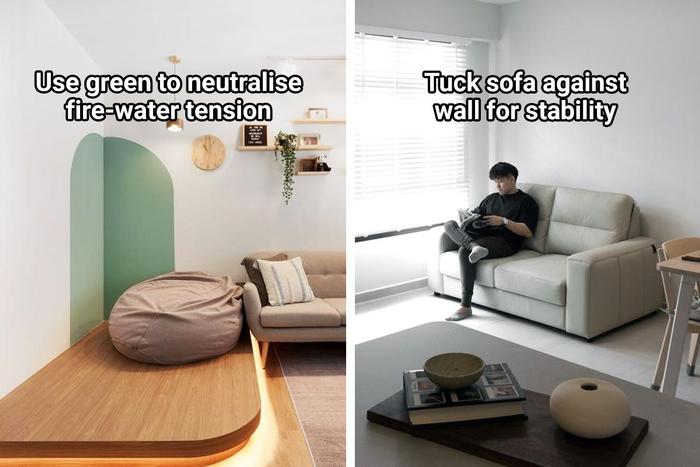All your questions about Fengshui-oriented home design answered!
Whether you believe in it or think it’s just a buzzword, Fengshui is still a widely practiced philosophy amongst Singapore homeowners.

However, given its complex nature (which involves tapping on natural energies to create harmonious environments), it's understandable why some homeowners might have a ton of questions about this ancient Chinese philosophy – particularly when practicing it at home.
So, to shed some light on Fengshui beliefs and concepts, we held an Instagram Q&A with Jacelyn Phang, the 2nd generation master from Fengshui consultancy Yuan Zhong Siu. Here are her answers to your most frequently asked questions!
1. Before renovating, who should you consult first? A Fengshui master or an interior designer?

View this project by Ovon Design
Master Jacelyn (J): If you’re consulting a Fengshui master about buying a house, you can shortlist a suitable interior designer around the same time. It’s ideal for both parties to be present during face-to-face discussions about your renovation, so that any suggestions or issues can be raised on the spot.
2. Is it possible for a home that’s designed around Fengshui to be aesthetically pleasing?

View this project by Noble Interior Design
MJ: Yes, definitely! Fengshui masters study environmental energies before making recommendations on details like furniture placement and room colours, so there’s a logical flow behind the entire consultation process.
Unlike what people might think, it’s not about imposing restrictions on design elements or features. For example, when we recommend a fire elemental colour, homeowners don’t necessarily have to pick red, because colours like pink, lilac, and lavender work as well.
Furthermore, the elemental colour doesn’t have to be on the walls, it can also be applied in the form of a simple accessory like a cushion that matches your home’s design style.
3. What’s the best colour palette to choose for good Fengshui at home?

View this project by Charlotte's Carpentry
MJ: When it comes to picking colours, there are two main considerations: 1) how the room is being used, and 2) the ba zi (destiny) of the occupants.
For example, in a couple’s home, if one partner has a birth element of water and the other has the fire element, we can neutralise this fire-water tension by incorporating colours that are associated with the wood element. For instance, shades of pastel green, mint, or other earthy hues.
4. What are your Fengshui tips to consider during a renovation?
MJ: To be honest, there are too many tips to recommend! [laughs] Also, more importantly, each person will have different lucky colours and recommended furniture placements for their home, so it’s best to consult a Fengshui master to get your ba zi for specific tips.
But still, there are some general tips that everyone can take note of for each room in their house.
For the living room:

View this project by MET Interior
- Place your sofa against the wall to evoke stability and safety.
- As much as possible, your windows should not be obstructed by trees to ensure good flow of chi into your home.
For the bedroom:

View this project by DISTINCTidENTITY
- Like sofas, it’s good to place your bed against a wall. It’s also great if you’re able to see the door when lying on your bed, but at the same time, your feet should not be pointing straight out of the door because this is the “coffin position”.
- Avoid placing electronic devices on your bedside table because they can interfere with the flow of chi in your bedroom.
- Don’t place mirrors opposite your bed or door. Instead, you can place them on the inside of your wardrobe door.
5. Are there any other tips that we should take note about mirror placement?

View this project by Fifth Avenue Interior
MJ: Generally, you should avoid having mirrors facing North. Mirrors come under the fire element, and since the North is of the water element, placing them together will result in conflict and tension at home.
6. What are your Fengshui tips for kitchens?

View this project by Ascend Design
MJ: The kitchen is a space that nourishes your body, so it’s important to your home’s Fengshui. Make sure that these items aren’t facing the kitchen stove:
- The sink
- Washing machine
- W.C./shower
Since all the above are associated with water, placing them directly opposite a stove can result in health and relationship issues due to the clash between fire and water.
7. Is it okay for my front door to be directly facing a window?

View this project by ChengYi Interior Design
MJ: From a Fengshui perspective, this isn’t ideal. The main door is a portal for good chi to enter your home and having a window in front of it will cause it to leave; this may result in the loss of job and wealth opportunities.
That said, we understand that some units are simply built in this way, so to resolve this issue, we recommend placing a divider – like a bookshelf or false wall – between the door and window to harness the chi.
Your dream home is just a few clicks away!
At Qanvast, we help you design your dream home. Tell us your renovation requirements and you’ll get personalised renovation quotes from five interior design firms – completely free!
Engaging an interior designer firm through our recommendation service has its perks, as you can opt in for the Qanvast Guarantee that safeguards up to $50,000 of your renovation deposits.
Stay up to date with the latest design trends – follow us on Telegram! 🙌

 Get a budget estimate before meeting IDs
Get a budget estimate before meeting IDs